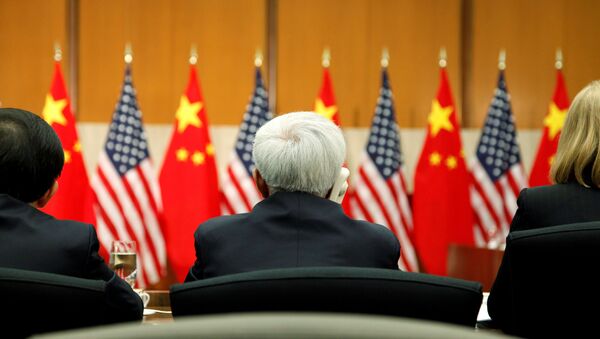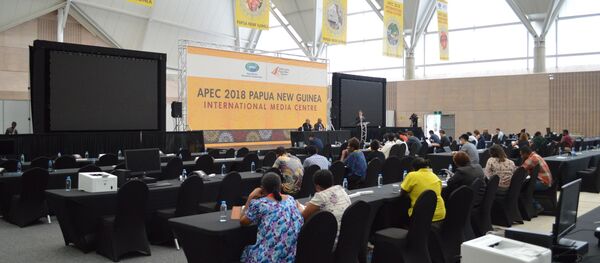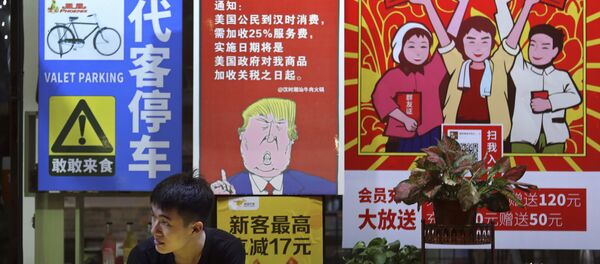For the first time since its establishment in 1989, the APEC summit failed to produce a communique endorsed by leaders from all 21 member states, following the annual conference in the capital of Papua New Guinea (PNG), Port Moresby, over the weekend.
The discord between the United States and China reached new lows during the meeting after members of the Chinese delegation reportedly tried to force their way into the office of PNG’s foreign minister and had to be escorted away by the police, US media reported. Beijing has denied that the incident took place.
In response, Chinese Foreign Minister Wang Yi accused "certain individual economies," without naming the United States, of trying to impose its wording on other nations.
"There were reasons behind the fact that the meeting did not release the communique. It is mainly because some individual economies insisted on imposing their own text for a communique on other parties, making excuses for protectionism and unilateralism, and refused to accept reasonable suggestions for revision proposed by China and other parties," Wang said in a statement released on Monday.
READ MORE: A More Chaotic Int'l Order Over the Next Decade — Former Diplomat on APEC Summit
The US State Department issued a similar statement pointing fingers at Beijing’s role during the APEC summit, without actually naming the country, on Monday.
"The United States was proud and fully prepared to join consensus on the draft APEC statements, agreeing to promote free and fair trade in the region and to combat unfair trade practices. It is unfortunate that not all economies — despite their rhetoric — could support these positions," the statement said.
Rivalry Platform
If US-Chinese relations continue to deteriorate toward a new cold war, international multilateral mechanisms such as the APEC could become "meaningless," political analysts warned.
"If the United States and China are moving toward a cold war, this kind of mechanism will become meaningless…. The international mechanism to manage multilateral relations was born in the 1990s when a new world order led by globalization… was being established. If a cold war re-emerges, a rivalry between two great powers will be the driving force of international relations. Such a mechanism will simply become a platform for the great powers to attack each other and force other nations to pick a side. The impact of such a mechanism will diminish gradually," Zhang Baohui, the director of the Center for Asian Pacific Studies at Hong Kong's Lingnan University, told Sputnik.
READ MORE: China Cuts US Bond Investments by Almost $14 Bln Amid Trade Row — Report
Instead of working with each other under multilateral mechanisms like the APEC, the United States and China could start to form new platforms that exclude the other side, the expert noted.
"The United States has already started to work on something like this. The Trans-Pacific Partnership [TPP] was created without China. The China-lead Asian Infrastructure Investment Bank did not include the United States. There’s a trend that both countries tried to start their own organizations without the other’s participation. This is not a good sign. But things may continue to move toward this direction," he said.
Nevertheless, the expert added that it was impossible for the United States to form new blocs similar to those during the Cold War to isolate China because the rest of the world has close economic ties with both of the great powers.
"I don’t think it’ll be like what it was during the cold war. That’s because most of the nations in the world have close economic ties with China. It’s impossible for them to give up on China, in support of the United States. Washington may have overestimated its strength in a cold war against China. The hawkish US officials probably believed the United States could rally its allies to contain China. But this is impossible because many of its allies have a larger trade volume with China than with the United States," he said.
Leadership Vacuum
After taking office in early 2017, US President Donald Trump has adopted an "America First" policy and has decided to withdraw from a series of international agreements such as the Paris Agreement on climate change, the TPP and the Joint Comprehensive Plan of Action, commonly known as the Iran nuclear deal.
Trump’s policy decisions have contributed to chaos at international mechanisms such as the APEC due to lack of leadership from the United States, political analysts suggested.
"It used to be the United States that used to lead organizations such as the World Trade Organization. During the [Barack] Obama Administration, the United States took a leadership role in concluding the TPP. Leaderships are very important for international organisations because you need powerful states to convince other nations. We have lacked that kind of leadership for some time, especially after Trump took office. That explains why we don’t see any multilateral deals being stricken today," Karen Pitakdumrongkit, deputy head and assistant professor at the S. Rajaratnam School of International Studies’ Center for Multilateralism Studies in Singapore, told Sputnik.
However, the Singapore-based scholar argued that other countries, especially in Asia, may be unconvinced of China’s leadership role because of its previous behaviour regarding international rulings.
"Other Asian nations would like the United States to engage in the region because many of them are worried about China’s rise. Even though they [Asian countries] don’t like the United States under Trump, they also don’t want to see the Chinese style of governance within Asia. There’s a lot of mistrust between those countries and the Chinese government. The issues with the South China Sea created a perception that the Chinese government will not play by the rule," she said.
READ MORE: Trump Hopes US Won't Have to Impose More Tariffs on China
The expert pointed out that China refused to accept the arbitrary 2016 ruling regarding territorial disputes in the South China Sea.
"That kind of hurt the Chinese reputation within Asia and Asian nations don’t trust if China could lead," she said.
Regardless of the rhetoric from Beijing on free trade, the suspicion from other nations is focused on whether the Chinese government will follow international rules they agreed on with other countries when the dispute touches Chinese interests as it did with the South China Sea, the expert added.
Views and opinions expressed in the article are those of Speakers and do not necessarily reflect those of Sputnik.




